

- The German Interstate Treaty has singularly failed in its objectives.
- The parallel system in Schleswig Holstein and restrictive nature of the Treaty has given rise to continual national and EU legal problems.
- The cultural and economic background create a tension between pro and anti-gambling interests.
- In the end the economy will decide the direction that regulation takes.
In late May, the 41 applicants for German gaming licenses under the German Intrastate Treaty on Gambling were told that a final evaluation was still pending. They now have to wait at least until August to find out if they would be awarded one of the 20 licenses on offer.
The Treaty came into force over a year ago on July 1 2012, and created a restricted licensing system for sports betting, but online poker and casino games are excluded. The year since the Treaty was signed has been marked by continual delays as the result of legal action.



